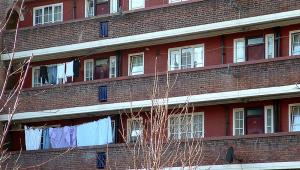By Keith Aitken in Edinburgh | 21 October 2013
Councils and other social landlords in Scotland face a rising tide of rent arrears as a consequence of the UK coalition’s ‘bedroom tax’, according to an expert report for the Scottish Parliament’s welfare reform committee.
The study, by Kenneth Gibb, professor of housing economics at Glasgow University, found that the cut in Housing Benefit for those tenants deemed to have more space than they need is failing to pressure people into downsizing, not least because of a shortage of available smaller properties.
He said that a ‘worryingly large’ number of tenants were building up rent arrears since the bedroom tax came into force, and predicted that the position would worsen with the next wave of coalition benefits reforms, notably the introduction of Universal Credit and Personal Independence Payments.
The report follows last week’s pledge by Deputy Prime Minister Nick Clegg to review the impact of the measure, and also comes hard on the heels of a promise from Scottish ministers at the weekend’s Scottish National Party conference that the bedroom tax would be abolished within a year of Scotland becoming independent.
Around 80,000 tenants in Scotland are subject to the measure, the proponents of which claim it will free up unused housing capacity. But Gibb found that ‘pull’ factors were far outweighing ‘push’ factors, and that tenants were staying put in their present homes and communities.
He said that at least a third of all one-bedroom properties are unavailable for downsizing by people affected by the bedroom tax because they are needed to house the homeless. With rent arrears mounting, the report said, Scottish ministers would have little choice but to continue discretionary payments – currently running at £20m a year – to mitigate the effects of the cut.
The committee was told by one council that two-thirds of tenants penalised by the bedroom tax were now in rent arrears, while another calculated that rehousing all those affected by the measure would take 19 years.
Gibb’s report urged the Scottish Housing Regulator and the Scottish Government to collate date on housing stock turnover by size of property.
Labour’s Michael McMahon, the committee convenor, said: ‘This research confirms what we heard in our committee meetings: that disabled people don't want to leave homes specifically adapted to best suit their needs and that separated families want space to come together as a family overnight.
‘It is not a case of “spare rooms” but of “space to live”, so homes have the capacity for either the facilities or loved ones that people need to make life worth living, he added.
‘No policy should put such basic rights at risk.’
SNP members of the committee also welcomed the report, but Conservative member Alex Johnstone claimed it was ‘politically skewed’.




















